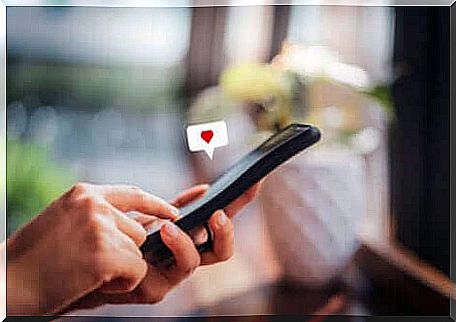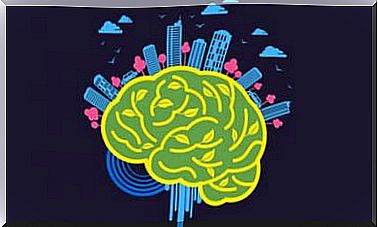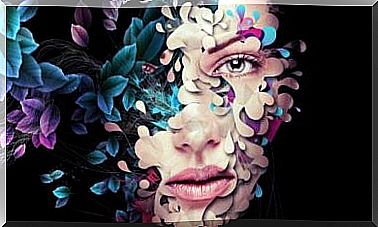How You Feel And What You Share On Social Media

Sometimes there is a pathological distance between how you feel and what you share on social media. This can be a significant source of anxiety. These platforms provide almost instant gratification, for a quick and effective dose of dopamine. But like any short-lived pleasure, you have to keep coming back for more. This can quickly become problematic.
Social media gives everyone equal opportunities to share content. In return, you face this invisible pressure to keep your content fresh and interesting.
In parallel, your motivation to please your audience leads to you not publishing anything that is “boring” or “unpleasant.” You have these imaginary fans who want to please and engage you, which motivates you to invent an alternate reality.
This begs the question of how this emotional difference between what you share on social media and how you feel affects your mental health.

A real danger
Today, many people rely on social media platforms like Facebook, Twitter, Snapchat, YouTube, Instagram or TikTok to connect with others. While they can be fun, informative, and helpful, it’s important to remember that social media doesn’t replace human connection in the real world.
You need human contact to activate the hormones that relieve stress and make you feel happier, healthier and more positive. Spending too much time on social networks can exacerbate mental health problems such as anxiety and depression.
Negative consequences of social media
- Feeling that your life is not good enough. Even if you know that the images you see on social media don’t tell the whole story, it’s easy to feel insecure.
- Fear of Missing Out (FOMO). This existed before the advent of social media. But Facebook and Instagram seem to reinforce the idea that everyone else is enjoying their lives more than you are. The idea that you are missing out on certain things can affect your self-esteem. It can cause anxiety and make you use social media even more.
- Insulation. A study from the University of Pennsylvania found that people feel lonelier when they use Facebook, Snapchat and Instagram more. On the other hand, reducing your social media use can make you feel less alone and less isolated. That improves your overall sense of well-being and satisfaction.
- Depression and anxiety. People need (and enjoy) personal contact. Nothing is better for reducing stress and improving your mood than spending time with someone you care about.
- Cyberbullying. About 10% of teens report being harassed or bullied on social media. Also, a large number of users report being the target of offensive and abusive comments.
- Self-absorption. Sharing selfies and intimate thoughts on social media can lead to unhealthy self-centeredness. It can also cause you to create a distance from making positive connections with others in the real world.
The pathological distance between how you feel and what you share on social media can cause anxiety
Social media can be problematic if it directly contributes to a reduction in the quality or frequency of face-to-face interactions.
The same goes if it distracts you from work, makes you sad or jealous, or if you use social media to make other people jealous. If any of these things are true in your case, it might be time to rethink how you use these platforms.
One of the potentially most problematic factors is not how often you publish. It’s about how honest you are when you share something. Talking on social media about how happy you are when you’re having a hard time can exacerbate anxiety.
Do you feel obligated to post?
Most of us have a small, loyal social media audience. You’re probably in an actual relationship with only about 10% of the people you follow (or the people you follow). Also, a very small percentage of people can make money by being ‘influencers’. In other words, nothing forces you to share things on social media.
The most you will get from being active on social media is the satisfaction of sharing information and content on certain topics. The impact your content has often depends more on how your followers feel about you than on the actual post you share or how you share it.
As we mentioned above, social media is a platform to showcase the best moments in your personal and professional life. However, it is rare for social media activity to have a positive impact on your well-being in the long term.
On the contrary, it is quite normal to feel pressured to post content, as if it were an animal to feed. This kind of pressure is problematic if it causes fear.

Wedding day
Here’s an example. Take a man who is getting married. He is excited about his wedding day and is also excited to share the photos from the event. But when the day comes, things start to go wrong from the start. It is very hot, he is arguing with his partner at the reception and he has a terrible back pain.
He probably still feels happy despite these minor setbacks. The fact remains, however, that the day is not what he expected it to be. He doesn’t feel like sharing the photos online. But, if he doesn’t, people will quickly start asking questions and he will feel uncomfortable.
Finally, he posts a photo of the reception where he looks happy and content. This is a hypothetical situation, but it happens every day in many different forms. You post things that portray emotions that you don’t really feel.
Distrust and rejection
Is that the kind of life you want to lead? You can face rejection and mistrust if your social media self strays too far from your real self.
Even the so-called ‘influencers’ cannot avoid this kind of suspicion from the people in their circle. However, they justify it by claiming that it is the way they make their living.
If there is a gap between what you really think and feel and what you post on social media, it can cause significant psychological problems. It also has the potential to pathologize your emotions, cognition, and behavior. This can have long-term consequences.
We’re not talking about stopping social media altogether. Instead, try to think about how you benefit from it. Is it doing you more harm than good? Does it increase your well-being or cause anxiety and problems with your self-image?
Social networks have become indispensable, so remember that learning from them and learning about yourself is an ongoing process. You are free to show who you really are, instead of making up a fake life to try to prove your worth.









